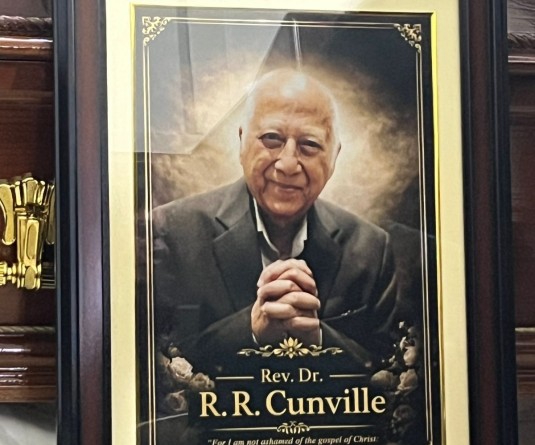
Dr Nsungbemo Ezung
Wokha Town
The enigma of Rashtriya Swayamsevak Sangh (RSS) in Indian social and political discourse, and its controversial role since its founding in 1925, and its impact in the country was best described by one of its most celebrated scholars, Ram Madhav, as, “The RSS is difficult to understand, but easy to misunderstand” [Ram Madhav. The Hindutva Paradigm, Westland Publications, 2021]. Misunderstood in the sense that the RSS itself was built on the foundation of an exclusive religious-based nationalism, and that the very word “Hindu Rashtra”, championed thus far by the RSS, conveys a message of discord in a secular country like India. No one in a secular India would feel secure or comfortable with an organization that vouch for a creation of a theocratic Hindu nation when modern South Asia had already experienced the devastating consequences of defining a nation based on religion so much so that many Hindus, including liberal and progressive Hindus, had already rejected the RSS’ Hindu Rashtra as a distorted version of Hinduism, and dismissed the Hindu Rashtra as something that has nothing to do with the mainstream Hindu’s religious faith and belief.
In fact, as India reeled under the demand for the creation of a Muslim nation at the end of colonial rule, the RSS version of India based on Hindu Rashtra remained in the background as the then secular Indian scholars and social and political leaders dismissed the idea of an independent India based on religion. For millions of enlightened and secular Indians, independent India does not only mean freedom from colonial rule but also freedom from the influence and dictates of any single religion, and that Indians, in free India, should have the freedom to practice any religion of his/her choice without fear and coercion.
To be fair with history, however, if India’s secular minds and liberal scholars today did not agree with the RSS idea of Hindu Rashtra, then they should equally reject the idea of Pakistan because of the fact that both the ideas of Hindu Rashtra and Pakistan defined India based on religion by discarding centuries of shared history of the Indian subcontinent, and which had led to the infamous partition of India. If the divisive politics, assumed “one India, one religion”, of the RSS today is threatening the communal harmony in the country and putting at stake the issue of religious freedom in a secular India, then one need to remember that it was the same divisive politics of the Muslim League during the last days of colonial rule that had shattered the hope of the secular Indians for creating a unified independent India, comprising of different religions, race and culture sharing and co-existing peacefully in one India. These painful historical facts have made it extremely difficult for the people of South Asia to reconcile with both the ideas of Hindu Rashtra and Pakistan.
Part of the difficulties in understanding the RSS, which will be celebrating its centenary year this October, perhaps lies in a dichotomy between Savarkar-Golwalkar’s Hindu Rashtra and Deendayal Upadhyaya’s Integral Humanism. While the RSS ideologues like Savarkar and Golwalkar promoted Hindu Rashtra, which represents the idea of defining the nation (India) within the framework of religion, another legendary figure of RSS, Deendayal Upadhyaya, preached a universal message of humanity by means of integrating all human race, culture, language and religion within the scope of humanity. In Deendayal Upadhyaya’s India and Integral Humanism, religion does not equate with any particular place of worship or any particular God, and thus every religion has a respectable place in the country, and that the beauty of India lies in the co-existence of different religious communities in the country. For RSS to be made acceptable to the people of India, it has to develop a synthesis between its cherished concept of Hindu Rashtra and the inspiring philosophy of humanity found in Deendayal Upadhyaya’s Integral Humanism.
Hard to understand RSS at the same time, in the sense that only the victims of South Asia’s historical mismanagement would comprehend how much RSS meant to them. A helpless refugee forcefully uprooted from his beloved homeland, looking for a refuge in a new place, would never forget a Good Samaritan who came to his rescue. This was exactly what the RSS meant for millions of Indian refugees from the then newly created Pakistan in 1947, who fled to India. For the vulnerable victims of Partition, the RSS was a friend in need, a protector and a facilitator.
It was during those violent and chaotic days of Partition, as refugees numbering millions from West Punjab, Sindh and East Pakistan fled to India, RSS volunteers stationed in places like Gujarat, Rajasthan, Punjab, Delhi and Bengal served as host to those refuges, setting up temporary places of shelters for them and served as liaison between the refugees and the government authorities for the smooth conduct of the rehabilitation process for the refugees. And perhaps it would be only those refugees and their posterity who would remember with gratitude the commendable humanitarian service of the RSS during one of the worst periods of Indian history.
The surprising fact about the RSS today is that it claims to have a membership of only around 6 million countrywide, out of more than 800 million Hindus in the country. Then what could be the possible factor that drives the RSS, which commands the loyalty of less than one percent of the Hindu population of India, to wield such an enormous influence in the country? The main factor behind RSS’s rising influence in India is that it serves as an ideological head of the ruling party in the country, the BJP, making the BJP an unofficial political wing of the RSS, with the latter serving as the ideological rallying ground that unified different factions within the BJP.
This BJP-RSS partnership/coordination for the last seven decades bears dividends for both the groups, so much so that from being a marginal player in Indian politics, the BJP went on to become the only national political alternative to the once dominant Indian National Congress (INC) and an RSS’s life-long volunteer serving today as the prime minister of India.
From being banned by the Government of India in 1948 after the assassination of Mahatma Gandhi (for the assassin’s association with the organization), the RSS, within the span of 100 years, could capture the national imagination of India, occupy a key central position in India’s social and political discourse and become an influential voice and lobby group at the corridor of political power in New Delhi.
As the RSS celebrates its 100 years of achievements and contributions to the country, its leadership and volunteers across the country cannot overlook the weight of expectations of the Indian religious minorities on its shoulders. Indian religious minorities still draw inspiration from the founding fathers of modern India, who envisage an independent India to be a secular India, where religious freedom is not only guaranteed to all Indians but also bestowed with honor and respect. And in its beyond the 100 years, the task of the RSS should be to fulfill the dreams of the founding fathers of India and the aspirations of different religious communities to live with freedom, dignity and honour, practising their religion freely in a secular India.





